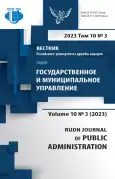Godfatherism and Its Effects on Nigeria’s Democracy
- Authors: Oghuvbu E.A.1
-
Affiliations:
- Delta State University
- Issue: Vol 10, No 3 (2023)
- Pages: 465-479
- Section: INTERNATIONAL EXPERIENCE OF PUBLIC ADMINISTRATION
- URL: https://journal-vniispk.ru/2312-8313/article/view/317981
- DOI: https://doi.org/10.22363/2312-8313-2023-10-3-465-479
- EDN: https://elibrary.ru/ZAVSFT
- ID: 317981
Cite item
Full Text
Abstract
Godfatherism has been the focal point of political gangalism in Africa and other developing countries around the globe. Godfatherism has been a hallmark of Nigeria’s democracy today. With the restoration of democratic rule in 1999, the nation has seen an increase in the politics of godfatherism, which has slowed the consolidation of democracy while also undermining efficient state governance and restricting rather than broadening democratic representation. Godfatherism has taken its toll in the country’s politics, causing disharmony, disunity, conflict, and disaffection among various political and interest groups in the country. Its lethargy has exacerbated electoral passivism and aparthism, slowing Nigeria’s democratic transition. This study therefore, investigates the causes, nature and effects of godfatherism on Nigeria’s nascent democracy. The paper based its investigation on the elite theory and the study reveals that political godfatherism is responsible for weak institutions in the country. The study therefore, concludes that political godfathers and godsons have denied the people the rights to vote for their preferred candidate as their leaders. The study however, recommends that voting should be reformed to make it more difficult for individuals and institutions to finance political parties and politicians, this will go a long way towards eradicating godfatherism in Nigeria, and give room for democracy to flourish.
Keywords
About the authors
Ejiroghene Augustine Oghuvbu
Delta State University
Author for correspondence.
Email: augustine4best@yahoo.com
ORCID iD: 0000-0003-1422-3806
Ph.D, Lecturer of the Department of History and International Studies, Faculty of Arts
1, Abraka-Umutu Rd., Abraka, NigeriaReferences
- Azeez K. Electoral Violence and Nigeria’s Elections. Journal of African Election. 2014;6(2):112-121.
- Osakede K.O., Ijimakinwa S.O. Political Godfatherism and Democratic Consolidation in Nigeria: Empirical Evidence from Oyo State and Kwara State. Arabian Journal of Business and Management Review. 2016;5:1-12.
- Igbini D.M., Okolie U.C. Godfatherism and its Threat to the Nigeria’s Nascent Democracy. Journal of Public Administration, Finance and law. 2020;17:93-105.
- Nkwede J.O., Ibeogu A.S., Nwankwo O.U. Political Godfatherism and Governance in a Developing Democracy: Insight from Nigeria. Academic Journal of Interdisciplinary Studies. 2014;3(4):137-143.
- Ohiole K., Ojo S. Political Godfatherism and Democratic Consolidation in Nigeria: Empirical Evidence from Oyo State and Kwara State. Arabian Journal of Business and Management Review. 2016;5(8):1-12.
- Attah A.P., Audu J.S., Haruna P.O. Godfatherism, Party Politics and Democracy in Nigeria: Issues and Challenges. Journal of Good Governance and Sustainable Development in Africa. 2014;2(2):86-93.
- Olawale I.A. Explaining ‘Godfatherism’ in Nigeria Politics. African Sociological Review. 2005;9(2):79-105.
- Bala J., Sonni G. Godfatherism in Nigerian Politics: Way forward. Journal of African Development. 1987;2(6):144-162.
- Scott J.C. Patron-client Politics and Political Change in Southeast Asia. American Political Science Review. 1972;66:92-102.
- Chukwuma O. Political Godfatherism in Nigeria: Benevolent or Malevolent Factors. International Journal of Social and Policy Issues. 2008;5(2):86-93.
- Onubi A. Godfatherism in Nigerian Politics: Essence. International Journal of Social and Policy. 2002;2(2):120-132.
- Agbaje O. Godfatherism and Future of Nigeria Democracy. African Journal of Political Science and International Relation. 2012;3(6):30-46.
- Ahmed F., Ali A. Politics and Godfatherism and its Implication on Socio-economic and Political Development of Nigeria. American International Journal of Social Science Research. 2019;4(1):9-19.
- Salawu B., Hassan A.O. Ethnic Politics and its Implications for the Survival of Democracy in Nigeria. Journal of Public Administration and Policy Research. 2011;3(2):28-33.
- Ugwu C.E., Izueke E., Obasi C.J. Godfatherism in Nigeria’s Politics: A Study of Obasanjo’s Civilian Administration (199-2007). International Journal of Research in Arts and Social Science. 2013;5:130-147.
- Richard J. Democracy and Prebendal Politics in Nigeria: The Rise and Fall of the Second Republic. Ibadan: Spctrum Books; 1999.
- Adeoye O.A. Godfatherism and the Future of Nigerian Democracy. American Journal of Political Science and International relations. 2009;3(6):268-272.
- Rasak B., Oye A.J., Ake M. Godfatherism and Political Patronage in Nigeria: A Theoretical Overview. Political Science Review. 2017;8(1):77-101.
- Oviasuyi P.O. Impact of Godfatherism on Nigerian Politics and Administration: Anambra and Oyo States Experiences. Educational Research Quarterly. 2009;33:30-46.
- Osayi F.O. Regressive Democracy: The Monstrous Role of Godfatherism in Nigeria. International Journal of Politics and Good Governance. 2015;6:1-25.
- Atere A., Akinwale A. Political Parties, Godfatherism and Succession Politics 2006 in Saliu A.H. et al. Democracy and Development in Nigeria: Conceptual Issues and Democratic Practice (144). Ilorin: University Press; 2006.
- Thovoethin P.S. Godfatherism and Democratic Consolidation in Nigeria: Issues and Perspectives. Essence Journal of Philosophy, Science and Society. 2004;1(1):69.
- Adeyemi-suenu W. Godfatherism and Political Development: Understanding Its Impact on Nigeria’s Emerging Democracy. Essence Journal of Philosophy, Science and Society. 2004;1(1):78.
- Pareto C. The Mind and Society. New York: Harcourt, Brace and Company; 1935.
- Mosca G.M. The Ruling Class. New York: Ann Arbor Publishers; 1939.
Supplementary files










